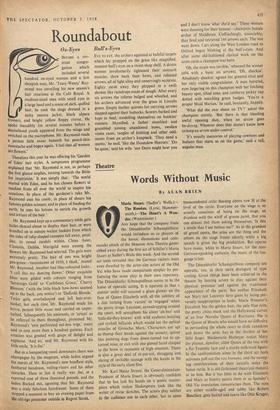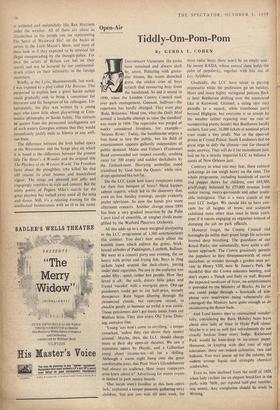Theatre
Words Without Music
By ALAN BRIEN
ANY hope that the company from the Dilsseldorfer Schauspielhaus would introduce us to players of the heroic dimensions and com- mando attack of the Moscow Arts Theatre giants ebbed away during the first act of Schiller's Maria Stuart at Sadler's Wells this week. And the second act soon revealed that the German visitors were even dwarfed by the actor-size actors of the Old Vic who have made comparison simpler by per- forming the same play in their own repertory. The Dtisseldorfer Schauspielhaus seems to be the home of operatic acting. It is operatic in that a sinister smile will succeed a glum glower on the face of Queen Elizabeth with all the subtlety of a disc turning from 'vacant' to 'engaged' when the penny drops. Leicester, eavesdropping around the court, will semaphore his silent `ah-has' and 'little-do-they-knows' with wild eyebrow-hoisting and eyeball billiards which would tax the optical muscles of troucho Marx. Characters are apt to thump their heads against the scenery, quiver like pointing dogs from down-turned toe to up- turned nose, or exit with one gloved hand clasped to the brow in moments of high emotion. There is also a great deal of oi-yoi-yoi, shrugging and slicing of invisible sausage with the hands in the style of the early, silent film.
Mr. Karl Heinz Stroux, the Generalintendant- Producer of Maria Stuart, is obviously confident that he has laid his hands on a poetic master- piece which makes Shakespeare look like the writer of revue sketches. The actors play neither to the audience nor to each other, but to some transcendental critic floating above row H at the level of the circle. Everyone on the stage is so acutely conscious of being on the stage, so drunken with the whiff of grease paint, that you can almost feel them asking themselves, 'Is this a simile that I see before me?' As in the grandest of grand opera, the arias are the thing and the others on the stage freeze silently while a big speech is given the big production. But operas have music, while in Maria Stuart, for the non- German-speaking audience, the music of the lan- guage is lost.
The Dilsseldorfer Schauspielhaus company are operatic, too, in their stern disregard of type casting. Great things have been achieved in the theatre by forcing actors to play against their physical presence and against the traditional appearance of the parts. But neither Elizabeth nor Mary nor Leicester here gains by being per- versely inappropriate in looks. Maria Wimmer's Elizabeth has the golden hair, the pale blue eyes, the pretty china mask and the Hollywood curves of an Ivor Novello Queen of Ruritania. She is the Queen of Hearts who would have no difficulty in persuading the whole court to clink cannikins and dance the antic hay to the rhythm of her little finger. Heidemarie Hatheyer makes Mary the plainer, dowdier, older Queen of the two with a flat Teutonic face and a sturdy milkmaid figure. In the confrontation scene in the third act both actresses pull out the vox humana, and the swoop- ing reverberations of their catcalls make the boxes rattle. It is old-fashioned theatrical rhetoric at its best. But it has little to do with Elizabeth and Mary as history paints them or as Spender's Old Vic translation romanticises them. The men are either middle-aged and tubby like Robert Benchley, grey haired and suave like Otto Kruger, 3r withered and melancholy like Rex Harrison _alder the weather. All of them are about as Elizabethan as the people you see representing The Spirit of .Westward Ho! on the backs of ,orries in the Lord Mayor's Show, and most of them look as if they expected to be arrested for illegal masquerading by the thought-police. For once the actors of Britain can loll on their laurels and not be lectured by our continental- ;truck critics on their inferiority to the foreign mummers.
Briefly, at the Lyric, Hammersmith, last week, I was exposed to a play called The Russian. This purported to explain how a great Soviet author could gradually sink to being a commissar for literature and the hangman of his colleagues. Un- fortunately, the play was 'written by a young man who knew little about playwriting or Com- munist philosophy or Soviet habits. The extracts he quotes from the persecuted intelligentsia are of such watery Georgian artiness that they would immediately justify exile to Siberia in any well-. run State.
The difference between the Irish ballad opera at the Westminster and the Synge play on which it is based is the difference between the present title The Heart's 4 Wonder and the original title The Playboy of the Western World. The Freudian farce about the ploughboy who killed his dad still retains its cruel bounce and knockabout vigour. The songs are pleasant and jolly and engagingly repetitive in style and content. But the misty poetry of Pegeen Mike's search for the great playboy has melted away amid all the song and dance. Still, it's a relaxing evening for the intellectual businessman with an 0 to his name.



















































 Previous page
Previous page